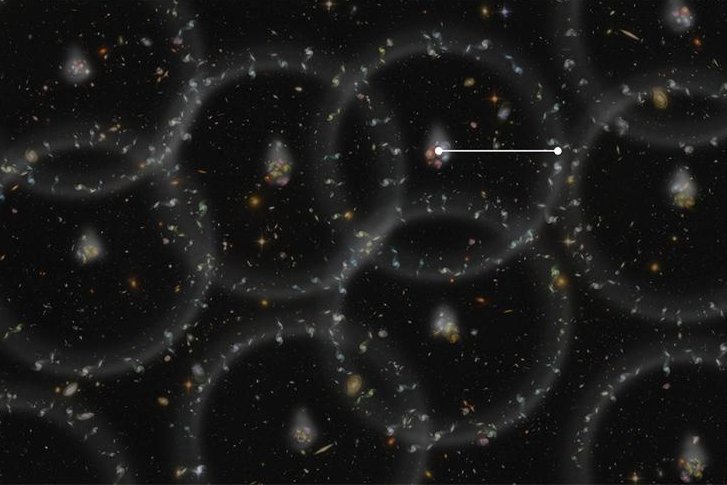An artist's concept of the latest, highly accurate measurement of the universe from BOSS. The spheres show the current size of the "baryon acoustic oscillations" (BAOs) from the early universe, which have helped to set the distribution of galaxies that we see in the universe today. (Credit: SDSS)
Astronomers have measured the distance between faraway galaxies to an accuracy of 1 percent, one of the most accurate surveys mapping of the cosmos.
The BOSS team, short for the Baryon Oscillation Spectroscopic Survey, used baryon acoustic oscillations (BAO) to measure intergalactic distances. BAOs are imprints of pressure waves that move through the universe and influence the scattering of galaxies.
"Nature has given us a beautiful ruler," said Ashley Ross, an astronomer from the University of Portsmouth. "The ruler happens to be half a billion light years long, so we can use it to measure distances precisely, even from very far away."
The findings reached using the Sloan Foundation Telescope in New Mexico, U.S. and was announced at the 223rd American Astronomical Society meeting in Washington DC.
By calculating these distances, researchers can use this data to understand other cosmological properties, like how dark energy, shown to be constant, accelerates the expansion of the universe.
The findings help decipher the curvature of space and whether the universe in infinite.
"While we can't say with certainty, it's likely the universe extends forever in space and will go on forever in time. Our results are consistent with an infinite universe," said said Prof David Schlegel, principal investigator of BOSS.
According to Schlegel, 20 years ago astronomers made estimates that differed up to 50 percent, which dropped to five percent five years ago and to two percent last year.
"One percent accuracy will be the standard for a long time to come," he added.
[BBC]
[BOSS]
[American Astronomical Society]















